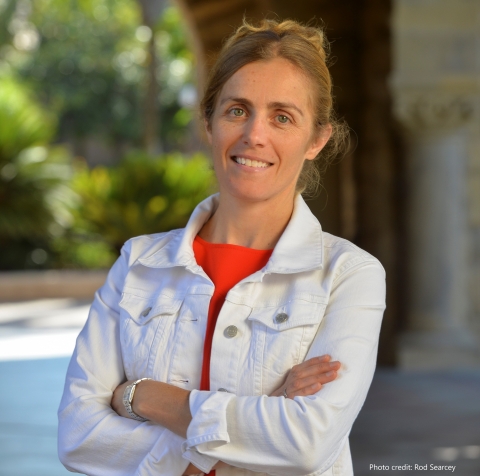Pascaline Dupas, a professor in the department of economics and a senior fellow at the Stanford Institute for Economic Policy Research, took over as the new faculty director for the King Center on Global Development at the beginning of this month.
“She is very clearly an outstanding choice to lead the center given that she is the senior development economist in the economics department — and that her own research, which is highly innovative and impactful, has focused squarely on issues at the very core of the center’s mission throughout her entire career,” Grant Miller, Dupas’ predecessor, wrote in a statement to The Daily.
Dupas has been at Stanford since 2011 and has been affiliated with leading labs and academic journals in the field of developmental economics, including the Abdul Latif Jameel Poverty Action Lab co-founded by Nobel Prize winner Esther Duflo.
“If you ask me to give you advice about the stock market, I’ll be incapable of doing that,” Dupas said, in an interview with The Daily. “But if you try to understand why some kids don’t learn anything in school […] economics is a very useful tool to understand how the education market works and the incentives that the various actors face.”
According to Dupas, one of the King Center’s key missions is to help in the fight against poverty, which is especially urgent during the COVID-19 pandemic.
“One way in which the King Center can contribute is in continuing to support big, ambitious initiatives by faculty who try to work very closely with big stakeholders and policymakers,” Dupas said.
Many such experienced faculty have relationships and networks which allow them to pivot their work quickly to focus on the effects of COVID-19, according to Dupas. She emphasized that the King Center intends to support these projects even if they require more funding than would be available traditionally in a given year. According to Dupas, the King Center is fortunate enough to have the resources to do that.
Dupas said that if the pandemic had happened 20 years ago, “research would have essentially stopped.” She added that the big difference between then and now is that everybody has a cellphone and a lot of real-time work is being done these days through phone surveys. Researchers are assessing the impacts of COVID-19 and communicating with policymakers in real-time.
“There’s almost more work now than before because things are more timely,” Dupas said, adding that she herself is just finishing work on a paper studying the effects of the lockdown in India on healthcare access for chronic care patients.
“This work is not just faculty from their offices thinking big thoughts, picking up the phone and telling the minister, ‘Hey, that’s what you should do.’” Dupas said. “It’s much more about teamwork.”
“[Dupas] has a long-standing commitment to working with undergraduate and graduate students to give them direct research experience in emerging economies,” wrote Jesper Sørensen Ph.D. ’96, professor of organizational behavior and director of Stanford Seed, in a statement to The Daily.
Dupas spoke about the importance of involving both undergraduate and graduate students, adding that she wants to ensure the King Center is inclusive in this process.
“It’s really wonderful if we have more scholars who are themselves from developing countries […] as well as underrepresented minorities,” Dupas said. “We have an opportunity to help attract to the discipline people from wider backgrounds.”
Jessica Leino, executive director of the King Center, reaffirmed this. “We look forward to continuing to build the center’s training programs by providing new opportunities for scholars — including those from low- and middle-income countries — which will further enhance the Stanford research community working on critical issues related to global development and poverty alleviation,” wrote Leino in a statement to The Daily.
Contact Smiti Mittal at smiti06 ‘at’ stanford.edu.
